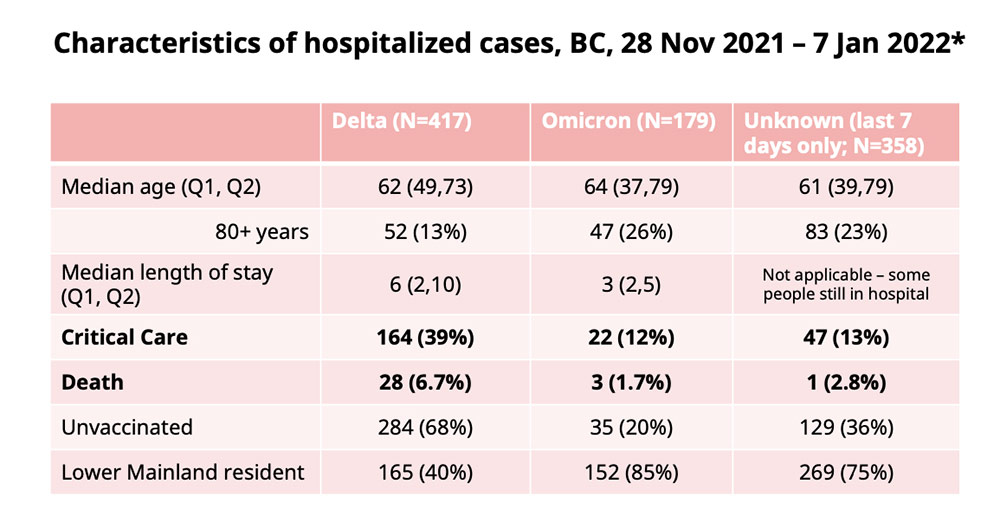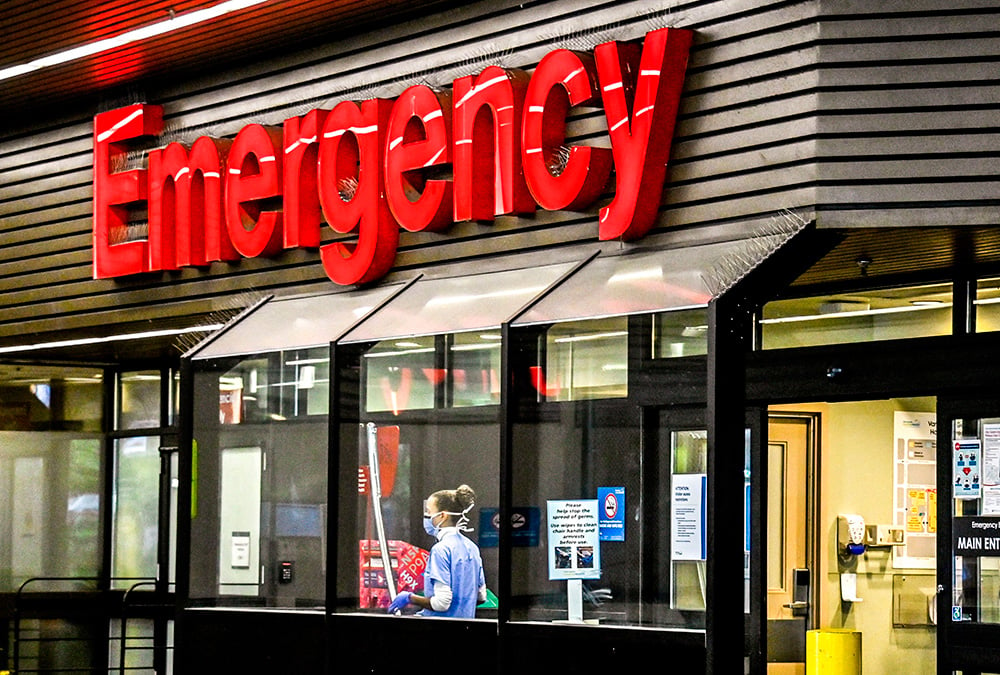British Columbia’s fifth pandemic wave may have peaked last weekend in the Lower Mainland, according to new provincial data, but “challenging” weeks still lie ahead for the health-care system.
About 40 new patients are being admitted to hospital with COVID-19 each day, a number that could reach 250 per day by the end of next week, the models suggest.
Provincial health officer Dr. Bonnie Henry presented the modelling today, which is based on testing wastewater for COVID, PCR testing trends and data from other jurisdictions to forecast the likely path of the variant in B.C.
Cases have been increasing sharply as the Omicron variant sweeps the province.
Henry said the water testing suggests the virus “peaked around the first week of January.”
Testing in all parts of the province has been overwhelmed and limited to high-risk people with symptoms, meaning real case counts are likely three to five times higher than reported each day.
Experts have said the province is “flying blind” and cast doubt on the accuracy of any modelling because of a lack of testing.
Henry said the test-positivity rate has decreased in recent weeks, signalling that transmission is trending down.
“This gives us more confidence that… at least in terms of transmission in the community, we’ve reached that peak and started our downward trajectory,” she said.
But with hospitalizations lagging cases by about a week, B.C. is not out of the woods.
“We are still at the point where our hospitalization rate is going up, so new hospitalizations are still a concern,” said Henry. “This is going to be a challenging week for our hospitals.”
Hospitalizations reached a new record on Thursday, with 534 patients being treated for the virus across B.C. The previous peak was 515 in April 2021.
Independent modelling earlier in January suggested B.C. could have about 4,000 patients in hospital at once by the end of the month.
Hospitals and staff are already hit by the Omicron wave, which has sent many health-care workers home ill.
From Jan. 3 to 9, 21,517 health-care workers were off ill for reasons including COVID-19, nearly triple the average number of sick workers the same week in 2020 and 2021.
But Omicron’s relatively milder impacts for vaccinated people means fewer people are requiring critical care or long hospital stays with the now-dominant variant.

About 12 per cent of confirmed Omicron patients required critical care from Nov. 28 to Jan. 7, compared to 39 per cent of patients infected by the Delta variant.
Half as many hospitalized Omicron patients are dying as did with Delta, Henry said.
And Omicron patients stay in hospital for an average of three days, about half of the length of stay for most Delta patients.
These differences will help blunt the pressure of Omicron hospitalizations on the health-care system, Henry said.
Although Omicron infects and transmits more easily in people with two doses of vaccine than Delta, vaccination remains a strong protection against serious illness and death, particularly among those under 70.
Hospitalizations among children have increased, the province said, including those too young to be vaccinated. Nine youth under 18 were admitted last week, and public health is seeing Omicron trigger respiratory issues like asthma in youth requiring hospital care.
Boosters are also proving extremely important for people over 60, Henry said, and age continues to be the single biggest risk factor for severe illness and death.
“We all need to do our part to protect those who are older,” she added.
But with higher transmission rates among people with two doses, the “halo effect” of vaccination that also protected unvaccinated people has weakened.
“Your risk has gone up dramatically,” Henry said to those without any shots.
People who are unvaccinated are 12 times more likely to be hospitalized, 27 times more likely to require critical care and 40 times more likely to die of COVID-19 than vaccinated people of the same age.
“Vaccination works. Vaccination protects you from that severe illness,” said Henry. “And that level of protection is what is getting us through this wave without overwhelming our health-care system, as stretched as it is.”
Henry urged British Columbians to get vaccinated and boosted as soon as they are eligible, to stay home when ill and to follow public health regulations to maintain any downward trend.
Restrictions on indoor capacity and closures of bars, gyms, nightclubs and sports tournaments have likely reduced cases by as much as 20 per cent, Henry estimated.
“This tells us that we need to keep doing what we’re doing right now,” she said, suggesting that by spring B.C. will be in a very different and more positive place.
“I do think this is a step closer to us living and the virus becoming endemic in our community over time,” Henry said. “What we don’t yet know is what those patterns will look like in the coming years and what the virus is going to look like.” ![]()
Read more: Coronavirus
















Tyee Commenting Guidelines
Comments that violate guidelines risk being deleted, and violations may result in a temporary or permanent user ban. Maintain the spirit of good conversation to stay in the discussion.
*Please note The Tyee is not a forum for spreading misinformation about COVID-19, denying its existence or minimizing its risk to public health.
Do:
Do not: